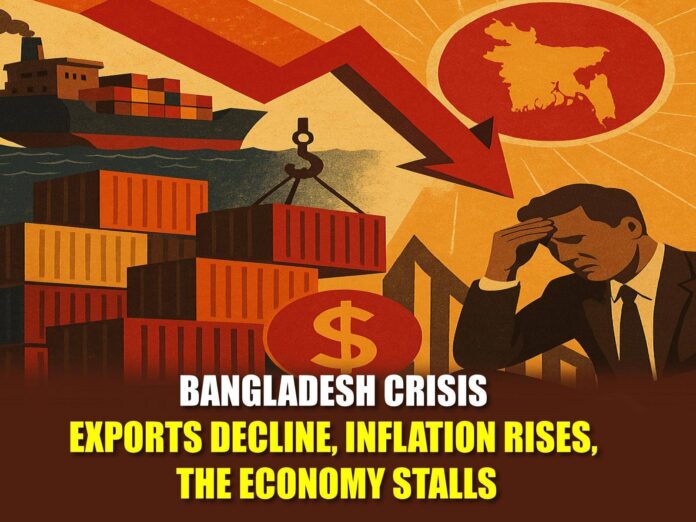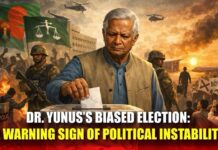Bangladesh’s economy is coming under mounting pressure.
Export earnings are declining, inflation is climbing, and private sector investment has virtually come to a halt.
What was once a relatively stable path of economic growth now appears choked by a combination of domestic and external shocks.
Continuous Fall in Exports
For two consecutive months, Bangladesh’s export sector has witnessed a steady decline.
Once considered the lifeblood of the national economy, the sector is now struggling on multiple fronts.
Falling demand in key markets, currency instability, and rising production costs have left exporters struggling to secure new orders.
At the same time, inflation—once somewhat contained after the change of government—has again taken an upward turn.
As a result, people’s purchasing power is shrinking, market volatility is growing, and the cost of living continues to soar.
Political and Financial Uncertainty
Political instability, high inflation, limited access to credit, and a tight monetary policy from the central bank have pushed the economy downward.
A liquidity crisis in the banking sector and rising interest rates are disrupting the normal flow of business and trade.
With high borrowing costs, political uncertainty, and an energy shortage, the economy now stands in a fragile and risky position.
Industrial production is being hampered, while shortages of electricity and gas are raising operating costs—weakening Bangladesh’s competitiveness in global markets.
Investment Paralysis
Many key industries have already halted production, and new investments have virtually frozen.
Entrepreneurs are hesitant to launch new projects amid uncertainty about future market conditions and policy continuity.
The pace of industrialization and job creation, once a hallmark of the economy, has now nearly come to a standstill.
Collapse in Foreign Income and Revenue Shortfall
To make matters worse, downgrades in international credit ratings, revenue deficits, and weaker remittance inflows have deepened the crisis.
The slowdown in remittances is straining foreign currency reserves, limiting the government’s ability to finance development projects and sustain import capacity.
As a result, several development programs are facing funding shortages, forcing the government to adopt austerity measures in many areas.
An Economy Searching for Direction
According to analysts, political stability and public confidence—under an elected, legitimate government—are essential to restoring momentum.
Only through investment-friendly policies, fiscal discipline, and production-oriented reforms can Bangladesh’s economy begin to recover.
Once celebrated globally for its robust growth story, Bangladesh’s economy now stands at a crossroads.
To reclaim that strength, the country needs foresighted policy, political will, and coordinated governance.
Otherwise, “the economy is stalling” may no longer be just a headline—
it could become a harsh reflection of reality.





